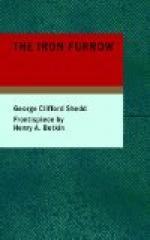CHAPTER XXVI
A week later the long-belated big storm appeared at hand. McDonnell telephoned Bryant one morning, a morning in February now, that the weather forecast predicted blizzard conditions sweeping down the Rocky Mountain region from the Northwest. A mile of excavation yet remained to do. Lee at once sent Saurez and other Mexicans abroad in the native settlements with offers of double wages and this drew the most indolent back to camp again. They were flung into the night shift, which toiled with increased vigour at news of the impending storm. For two days and nights the desperate effort was pushed while the sky continued clear, with the crews of both camps attacking the iron earth and steadily forging closer.
Bryant scarcely slept during that time, or ate. Toward morning, when the night shift went off, he would cast himself down fully dressed and drawing the blankets to his chin sleep restlessly for two or three hours, then again rise to drive the work. The third day came sunny and quiet, but with heavy warmth in the air wholly strange to the season. During the night both Lee and Pat had continually and anxiously watched the peaks of the Ventisquero Range for portent of the change imminent in the weather; and now on this morning they beheld about the crests long, low-lying layers of gray cloud.
Again McDonnell telephoned, but now with particulars of the storm. It was general in character, covering the states from the Canadian line southward, with very low temperatures and raging furiously, destroying wire communications and blocking railroads, and at the moment was bearing down across Utah, Colorado, and Kansas. The entire region from the Pacific coast to the Mississippi was in its grasp.
“Ten days is all that’s left of our time,” Lee said to the contractor, with a heavy heart. “And no one can tell how long this weather spree will last.”
“It’s not a mile we’ve got to go any more, any way. With what we’ll do to-day it will be half a mile of dirt moved in three days. That leaves but half a mile. This storm may be played out when it reaches us.” But the worry on his face showed that he put little faith in this possibility.
What he stated in regard to the ditch was true. The work of night and day had eaten well into the remaining mile between the two camps. To be sure, it had been rushed work: the sides of the ditch were gouged and ragged, the bottom uneven and rutted, and the removed dirt was piled anywhere along its banks. But nevertheless there was a canal, dug on grade and to measurement, and capable of carrying water.
During the afternoon a pair of men drove two lines of waist-high stakes to mark the survey of the short section of ground yet untouched, doing this under Carrigan’s supervision. In case snow came, he told Lee, he wanted something he could see. “Nine hundred yards of unbuilt ditch will be lying buried,” he added, “and I don’t propose to paw up the whole mesa finding this section.”




